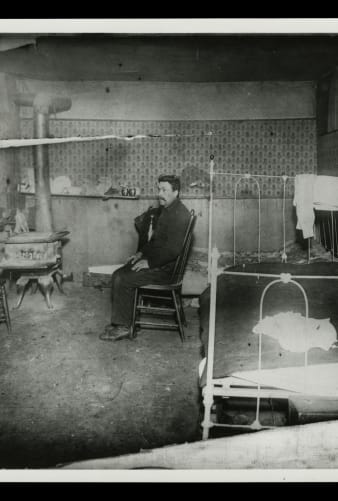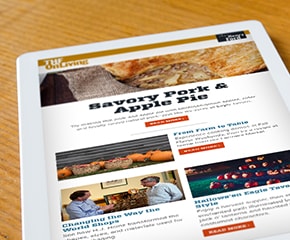
Popular Research Topics
Ford Motor Company Sociological Department & English School
With the success of the Ford Model T after its introduction in 1908, Ford Motor Company became the leading manufacturer of automobiles in the world. By 1914, the integration of the progressive assembly line made high-volume and efficient production at Ford Motor Company plants an exemplary model for mass production. Ford’s demand for cheap labor and the lure of high wages—with the $5 day profit sharing plan—drew thousands of immigrants and migrants to Detroit.
In order to manage and control such a large and diverse workforce, John R. Lee, Head of Personnel, created the Sociological Department in 1914. The Sociological Department established a system of rules and codes of behavior for Ford employees that they had to meet, in order to qualify for the $5 day pay rate. The Sociological Department monitored employees at home, as well as on the job. Investigators made unannounced visits to employees' homes and evaluated the cleanliness of the home, noted if the family had renters, checked with school attendance offices to determine if children were attending school and monitored bank records to verify that employees made regular deposits. Sociological Department investigators also assisted workers' families by teaching wives about home care, cooking and hygiene.

An adjunct to the Sociological Department was the Ford English School. Originally established in 1913, the Ford English School addressed the problem of communicating with non-English speaking workers who didn’t share a common language, and the potential threats to safety that this posed.

At a time when worker safety was rarely considered in most factories, Ford Motor Company officials took great pains to ensure that the factory was as safe as possible. English classes taught by Ford employees were offered free of charge to foreign employees; however, students were required to attend classes before or after their work shifts. Students were taught by mimicking instructors who held up objects such as tea kettles and soap, repeating the words of the instructor. This simple vocabulary would form the foundation for more complex sentences so that by the end of the course students attained basic English reading and speaking comprehension skills.

Ford’s English program was so successful that other companies and social organizations patterned their programs after it. A Ford English School diploma was considered so valuable that an immigrant seeking naturalization could use it to meet many of the requirements needed before taking the final citizenship exam.
The culmination of the Ford English School program was the graduation ceremony where students were transformed into Americans. During the ceremony speakers gave rousing patriotic speeches and factory bands played marches and patriotic songs. The highlight of the event would be the transformation of immigrants into Americans. Students dressed in costumes reminiscent of their native homes stepped into a massive stage-prop cauldron that had a banner across the front identifying it as the AMERICAN MELTING POT. Seconds later, after a quick change out of sight of the audience, students emerged wearing “American” suits and hats, waving American flags, having undergone a spiritual smelting process where the impurities of foreignness were burnt off as slag to be tossed away leaving a new 100% American.
Bibliography
- Archives (Ford Motor Company), Oral History subgroup, 1951-1961, Accession 65.
- Archives (Ford Motor Company), Photographic vertical file, 1890-1980, Accession 1660.
- Archives (Ford Motor Company), Owen Bombard information files chronological histories, 1863-1958, Accession 902.
- Archives Vertical File.
- Edsel B. Ford Office papers, 1903-1945, Accession 6.
- Ford Motor Company Auditing Department, Income tax records. 1906-1923, Accession 259.
- Ford Motor Company Auditing Department, Wendell Miller records, 1923-1947, Accession 391.
- Ford Motor Company Finance Division Vice President of Finance records, Accession 459.
- Ford Motor Company Non-Serial Imprints collection, 1903-2004, Accession 951.
- Ford Motor Company Office of Public releases Press releases, 1942-1955, Accession 536.
- Ford Motor Company Public Relations, William John Cameron records, Accession 44 and 474.
- Ford Motor Company Sociological Department procedure manuals, ca. 1933, 1946, Accession 280.
- Ford Motor Company Sociological Department Profit-Sharing Plan reports, 1915, Accession 1018.
- Ford Motor Company Superintendent's Office Charles E. Sorensen records, 1913-1946, Accession 38.
- Ford Times (publication).
- Frank Ernest Hill research papers, 1950-1966, Accession 940.
- Henry Ford Office records, Engineering Laboratory records, 1921-1952, Accession 285.
- Henry Ford Office records, Non-Automotive Interests, 1916-1931, Accession 62.
- John F. Dodge Estate Trust Lawsuit collection, 1902-1928, Accession 96.
- Nevins and Hill research, original documents and notes, 1845-1960, Accession 572.
- Samuel Simpson Marquis papers, Accession 63 and 293.
- Stanley Leonard Knazak papers, Accession 1200.
Additional information on the Ford English School may be found in the following archival collections:
- Archives (Ford Motor Company), Oral History subgroup, 1951-1961, Accession 65.
- Archives (Ford Motor Company), Photographic vertical file, 1890-1980, Accession 1660.
- Archives Vertical File.
- Cliff Colling papers, 1917, Accession 1544.
- Five Dollar Day collection, 1909-1919, Accession 683.
- Ford Motor Company non-serial imprints collection, 1903-2004, Accession 951.
- Ford Times (publication), n/a.
- Henry Ford and Ford Family papers, Fair Lane papers, 1835-1955, Accession 1.
- Henry Ford Office records, Personal topics subject files, General personal records, 1823-1984, Accession 23.
- Nevins and Hill research, original documents and notes, 1845-1960, Accession 572.
Related Content
Artifacts Related to Sociological Department & English School
Ford English School Classroom at the Highland Park Plant, 1914-1915
Artifact
Photographic print
Summary
Founded in 1914 to address the language needs for Ford's ever-expanding immigrant labor force, the Ford English School used this method of language training to quickly give students a basic and functional vocabulary of English words to help them integrate into American society. In addition to English, the school also taught students, many attending classes before or after their regular shifts, the requirements needed to pass citizenship tests including American geography as seen on the blackboard in the background.
Place of Creation
Object ID
84.1.1660.P.833.979
Credit
From the Collections of The Henry Ford. Gift of Ford Motor Company.
Location
By Request in the Benson Ford Research Center
Get more details in Digital Collections at:
Ford English School Classroom at the Highland Park Plant, 1914-1915
What is The Henry Ford?
The national attraction for discovering your ingenuity while exploring America’s spirit of innovation. There is always much to see and do at The Henry Ford.
Checking on Ford Employees Home Conditions, Views from "Factory Facts From Ford," 1917
Artifact
Photographic print
Summary
Beyond revolutionizing America's industrial production, Henry Ford and other managers at Ford Motor Company instituted a wide-reaching corporate welfare program that opened up the most intimate and personal details of employee's personal, family, and financial life to investigators from the Sociological Department. After the announcement of the $5 per day profit sharing plan in January 1914, Henry Ford wanted to ensure that employees, many of whom were non-English speaking immigrants, did not squander the funds. To this end, the Ford Sociological Department was created to investigate and monitor the personal and work lives of employees to the extent that investigators (later called Advisors) conducted home visits, checked bank deposits, and monitored children's school attendance as well as divorce filings. In addition, the Sociological Department advisors provided hygiene instruction, financial and legal advice, and worked with the English School to teach Ford's immigrant workers English.
Object ID
84.1.1660.P.O.5100
Credit
From the Collections of The Henry Ford. Gift of Ford Motor Company.
Location
By Request in the Benson Ford Research Center
Get more details in Digital Collections at:
Checking on Ford Employees Home Conditions, Views from "Factory Facts From Ford," 1917
What is The Henry Ford?
The national attraction for discovering your ingenuity while exploring America’s spirit of innovation. There is always much to see and do at The Henry Ford.
Corporate Publication, "Facts from Ford," September 1920
Artifact
Publication (Document)
Date Made
September 1920
Summary
Facts from Ford, published by Ford Motor Company's Sociological Department, kept Ford employees informed about their place of employment. This 1920 issue highlighted the ethnic diversity found at the Highland Park plant and included photographs of 60 workers, all with different nationalities. Ford tried to keep the number of foreign-born employees proportional to Detroit's foreign population.
Creators
Keywords
Object ID
64.167.38.2
Credit
From the Collections of The Henry Ford. Gift of Ford Motor Company.
Location
By Request in the Benson Ford Research Center
Get more details in Digital Collections at:
Corporate Publication, "Facts from Ford," September 1920
What is The Henry Ford?
The national attraction for discovering your ingenuity while exploring America’s spirit of innovation. There is always much to see and do at The Henry Ford.

Document Noting Living Conditions of Ford Motor Company Employees, According to Nationality, as of January 12th, 1917
 Details
Details
Document Noting Living Conditions of Ford Motor Company Employees, According to Nationality, as of January 12th, 1917
Artifact
Document
Date Made
12 January 1917
Summary
Ford Motor Company's Sociological Department, established in 1914, sent investigators to make unannounced visits to evaluate the cleanliness and safety of an employee's household. Investigators that entered workers' homes took notes, filled out forms, and compiled statistics based on their findings. This document organized living conditions by employee nationality and gave ratings of "Good," "Fair" and "Poor" conditions.
Object ID
64.167.572.3.17
Credit
From the Collections of The Henry Ford. Gift of Ford Motor Company.
Location
By Request in the Benson Ford Research Center
Get more details in Digital Collections at:
Document Noting Living Conditions of Ford Motor Company Employees, According to Nationality, as of January 12th, 1917
What is The Henry Ford?
The national attraction for discovering your ingenuity while exploring America’s spirit of innovation. There is always much to see and do at The Henry Ford.
Ford English School at the Highland Park Plant, 1914-1915
Artifact
Photographic print
Summary
Founded in 1914, the Ford English School taught foreign-born Ford Motor Company employees to read, write and speak English. The instructors were foremen, clerks and workmen from the Highland Park plant who volunteered their time to teach their co-workers. The school began with 20 students and one instructor, and it grew to more than 2,200 students and nearly 150 instructors by 1916.
Object ID
84.1.1660.P.O.1264
Credit
From the Collections of The Henry Ford. Gift of Ford Motor Company.
Location
By Request in the Benson Ford Research Center
Get more details in Digital Collections at:
Ford English School at the Highland Park Plant, 1914-1915
What is The Henry Ford?
The national attraction for discovering your ingenuity while exploring America’s spirit of innovation. There is always much to see and do at The Henry Ford.
Melting Pot Ceremony at Ford English School, July 4, 1917
Artifact
Photographic print
Summary
In 1914 Ford Motor Company established the Ford English School, where the automaker's diverse immigrant employees could learn the English language and take civics lessons in preparation for becoming U.S. citizens. At the graduation ceremony, students wearing clothing from their native countries descended into a large "American Melting Pot" and emerged wearing homogenous suits and waving American flags.
Object ID
84.1.1660.P.O.7227
Credit
From the Collections of The Henry Ford. Gift of Ford Motor Company.
Location
By Request in the Benson Ford Research Center
Get more details in Digital Collections at:
Melting Pot Ceremony at Ford English School, July 4, 1917
What is The Henry Ford?
The national attraction for discovering your ingenuity while exploring America’s spirit of innovation. There is always much to see and do at The Henry Ford.


Undesirable Home Surroundings Found on First Investigation, Ford Sociological Department, 1914-1915
 Details
Details
Undesirable Home Surroundings Found on First Investigation, Ford Sociological Department, 1914-1915
Artifact
Photographic print
Summary
Ford Motor Company established its Sociological Department in 1914. The department established rules and conditions that Ford employees had to meet to qualify for the company's Five Dollar Day pay rate. Department officials monitored employees both at work and at home. This photograph documented what the department considered to be undesirable living conditions at an employee's house.
Keywords
Object ID
84.1.1660.P.O.4546.1
Credit
From the Collections of The Henry Ford. Gift of Ford Motor Company.
Location
By Request in the Benson Ford Research Center
Get more details in Digital Collections at:
Undesirable Home Surroundings Found on First Investigation, Ford Sociological Department, 1914-1915
What is The Henry Ford?
The national attraction for discovering your ingenuity while exploring America’s spirit of innovation. There is always much to see and do at The Henry Ford.
Undesirable Employee Home Conditions, Ford Sociological Department, circa 1914
Artifact
Photographic print
Summary
Ford Motor Company established its Sociological Department in 1914. The department established rules and conditions that Ford employees had to meet to qualify for the company's Five Dollar Day pay rate. Department officials monitored employees both at work and at home. This photograph documented what the department considered to be undesirable living conditions at an employee's house.
Keywords
Object ID
84.1.1660.P.O.5372
Credit
From the Collections of The Henry Ford. Gift of Ford Motor Company.
Location
By Request in the Benson Ford Research Center
Get more details in Digital Collections at:
Undesirable Employee Home Conditions, Ford Sociological Department, circa 1914
What is The Henry Ford?
The national attraction for discovering your ingenuity while exploring America’s spirit of innovation. There is always much to see and do at The Henry Ford.
Unimproved Kitchen of Employee's Home, Ford Sociological Department, circa 1914
Artifact
Photographic print
Summary
Ford Motor Company established its Sociological Department in 1914. The department established rules and conditions that Ford employees had to meet to qualify for the company's Five Dollar Day pay rate. Department officials monitored employees both at work and at home. This photograph documented what the department considered to be undesirable living conditions at an employee's house.
Keywords
Object ID
84.1.1660.P.O.8680
Credit
From the Collections of The Henry Ford. Gift of Ford Motor Company.
Location
By Request in the Benson Ford Research Center
Get more details in Digital Collections at:
Unimproved Kitchen of Employee's Home, Ford Sociological Department, circa 1914
What is The Henry Ford?
The national attraction for discovering your ingenuity while exploring America’s spirit of innovation. There is always much to see and do at The Henry Ford.























